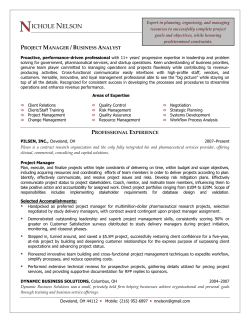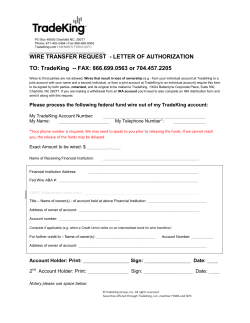
“What’s Wrong with Mandatory Safety Training…and How to Fix It!”
“What’s Wrong with Mandatory Safety Training…and How to Fix It!” Jonathan Klane, M.S.Ed., CIH, CHMM, CET, Assistant Director of Safety Programs Arizona State University - Ira A. Fulton Schools of Engineering (480) 965-8498 - jonathan.klane@asu.edu Fredi Doerstling Chemical Safety Specialist Arizona State University - Ira A. Fulton Schools of Engineering (480) 965-4601 fdoerstl@asu.edu 1 Needs assessment (questions?) Learning objectives (ours for you - yours?) “Givens” (not Robin) Problems (existing and future) Fixes (how to make it better) ALPs (no, not the mountains! ;-) Case studies (examples of don’ts and dos) Closing thoughts (where from here?) Questions (anything else)? 2 …what do you want to discuss or learn? Discuss with your seat mate(s) 3 At the conclusion of this session participants should be able to: Describe at least three problems with mandatory training; Explain how to “fix” these problems; and Demonstrate more effective and “learner-friendly” training. Do you have another one? 4 Adult learners/learning: Self-directed Participate Discuss Share expertise Applicable and fill a “need” “Active” learning Mandatory training 180o counter 5 not the problem… …our attempts at compliance are! Q: OSHA requires training to be what? A: Effective! OSHA is 6 is not the problem… …our (over-, mis-, and/or ab-) use of it is! Technology 7 Lack of a training needs assessment 8 No (decent) learning objectives 9 Ineffective training delivery 10 Too heavy an emphasis on information (over learner needs) 11 Too heavy an emphasis on cognitive domain (not enough on affective and kinesthetic ones) 12 Too much lecture and not nearly enough active approaches and methods 13 An expectation of automatic learning outcomes, behavior changes, etc. 14 An over reliance on written tests 15 Viewing training as: a stand-alone entity, a panacea (cure-all), or the sole tool or solution available. 16 Always putting the learners’ needs first! 17 Conducting a training needs assessment! 18 Using / following the ANSI/ASSE Z490 Standard – “Accepted EHS Training Practices”! 19 Involving the students in setting learning goals! 20 Being more of a facilitator of other’s learning! 21 Keeping a positive attitude and not getting defensive! 22 Use of humor in general! 23 Self-deprecating humor by the trainer/facilitator! 24 Learning benefits of students doing the teaching! 25 Personalizing the teaching! 26 The positive learning aspects of trainee (and trainer) mistakes! 27 Flexibility in topic discussions! 28 Validating accomplishment of learning objectives! 29 Ice Breakers, Demonstration, Role-playing, Question and answer (Q&A), Game-playing, Pairs or dyads, Triads, Small group work, Case studies, Fishbowl, Teaching others, Video, Brain-storming, Large group, open discussion, Co-training, Safe experiments, Tours, Hands-on, Pre-/Post-tests, Problem-solving, or Ad lib or spontaneous training ! 30 1. 2. 3. 4. 5. Your mandatory OSHA trainer refresher College Health Clinic staff Not wearing safety glasses (lumber mill) Asbestos worker course – can’t read well Umpteenth HAZWOPER refresher 31 OSHA wants to update trainers OSHA wants no fraud or bad training Refreshers required every 4 years Experienced EHS trainers What to do? 32 BBP annual refresher Doc’s, RNs, PTs, EMTs, Coaches 30-minute session What to do? 33 Lumber mill/yard workers not wearing safety glasses consistently Due for annual refreshers (PPE, hazcom, ergo, BBPs, LOTO, etc.) What to do? 34 10 workers at gas pipeline facility Need Asbestos Abatement Worker Initial Course Some from CT, some from MS 1 each are reading-challenged Must get >70% on written exam (or cannot do work)! What to do? 35 Environmental engineering consultants Engineers, Geologists, Scientists, Risk Assessors (chemicals), others Most are on umpteenth refresher (10+ to 20+ years) A few “newbies” What to do? 36 37 Where do we go from here? Is it a training need? If it is, what is/are the training need(s)? Are there other ways and means? Develop effective LOs! Design active training! Deliver learner-centered/friendly training! Don’t always give a test! Strive to improve! 38 39 Jonathan Klane, M.S.Ed., CIH, CHMM, CET, Assistant Director of Safety Programs Arizona State University - Ira A. Fulton Schools of Engineering (480) 965-8498 - jonathan.klane@asu.edu Fredi Doerstling Chemical Safety Specialist Arizona State University - Ira A. Fulton Schools of Engineering (480) 965-4601 fdoerstl@asu.edu 40
© Copyright 2025





















